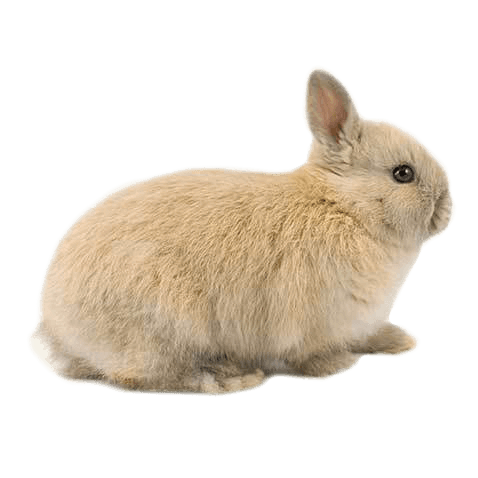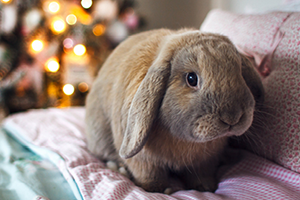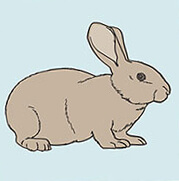As we head into the colder months, it’s time to…
Read more
A baby-faced breed with affection to go around
The small, fluffy Netherland Dwarf Rabbit looks like a kit no matter how old it gets, with large eyes and heads giving it a youthful look. The breed can be easily frightened and skittish but, with plenty of love and care, make gentle, affectionate pets.
Vital Stats
| Size: | Extra small, weighing about 500g (1lb). |
|---|---|
| Coat: | Short, soft fur that requires weekly grooming. They are bred in a variety of colours including chestnut, black, otter, tan and orange. |
| Life span: | 7-10 years. |
| Temperament: | Despite their cuddly appearance, Netherland Dwarf Rabbits have a slightly wild disposition and dislike being picked up. It may take some time, but once trust has been established with these rabbits, they’ll show their calmer, tamer side. |
coat Temperament wild Life span 8+years

common illnesses in a Netherland Dwarf
Common Netherland Dwarf Health Conditions
As a rabbit owner you will want what’s best for your pet’s health so they can live a long, happy life. Like all breeds, Netherland Dwarfs are prone to certain health conditions. To help you be more aware and prepared for these potential ailments if they should arise, we have put together information on the health issues that we see the most in Netherland Dwarfs.
Common Netherland Dwarf Health Conditions
Respiratory tract disorders +
As rabbits have a relatively small lung space, respiratory infections are quite common across all breeds. Netherland Dwarfs are prone to respiratory conditions because the roots of their upper teeth sit just below their sinuses. If the upper teeth and gums become inflamed, this can lead to sinus infections.
Other respiratory conditions can include snuffles, a term used to describe symptoms including rapid breathing, a runny nose and eyes, and coughing. The pasteurella bacteria can cause this infection, and can be spread between rabbits. If treated promptly, a course of antibiotics will successfully clear up the condition.
Dental disease +
Many rabbits suffer from dental problems. Because rabbits’ teeth are constantly growing, they need a good, balanced diet with plenty of hay to help wear down teeth at an even rate. Netherland Dwarfs are particularly prone to dental disorders because of their smaller heads and slightly longer jaw, which can create misalignment problems.
They can suffer from mandibular prognathism, which leads to abnormal patterns of dental wear, causing elongated teeth or altered teeth positions. Symptoms include weight loss, dribbling or gut problems.
Vets can burr down teeth under anaesthetic to help improve misalignment and remove sharp spikes, which might dig into the sensitive tissues of the tongue and cheeks.
Parasites +
Parasites are a common problem among all breeds of rabbit. Cheyletiella mites in particular can cause itching and hair loss, but can be easily treated with anti-mite preparations in the form of an injection or spot-on treatment.
The E cuniculi parasite, which affects many rabbits, including Netherland Dwarfs, can be more difficult to treat. It’s spread by spores in contaminated urine and can be passed on to other rabbits. Although some rabbits with the parasite are symptomless, others are more sensitive. Symptoms include excessive thirst and urination, cataracts, head tilt and paralysis in the back legs. Although the parasite can’t be removed entirely, symptoms can be managed with worming treatments.
Gastrointestinal disorders +
Rabbits’ digestive tracts are very sensitive – they need lots of fibre to stimulate gut movement and help maintain a healthy digestive system. Conditions such as gastric stasis can occur when the gut stops working or is obstructed, creating a build-up of gas and bacteria that causes bloating. The condition can lead to the release of toxins, which can be fatal if left untreated.
Although relatively common in all rabbits, some breeds are more susceptible to gastrointestinal disorders than others. Rabbits prone to dental problems, such as Netherland Dwarf Rabbits, and those that are easily stressed, may lose their appetite and therefore not eat the fibre they need to keep their guts moving. Symptoms include loss of appetite, lethargy, a hunched posture, reduced bowel movements and diarrhoea.
Treatment may involve the use of motility drugs to help stimulate gut movement, pain medication and antibiotics. Providing plenty of fresh hay, and limiting pelleted food and treats, will ensure the rabbit gets enough fibre to prevent gastrointestinal disorders.
Uterine cancer +
Cancer of the uterus is the most common form of cancer in female rabbits, and Netherland Dwarf Rabbits have an increased risk of developing it.
Symptoms include fertility problems and stillbirths, loss of appetite and blood in the urine. In some cases, the cancer can spread to the lungs and cause breathing difficulties. If caught early enough to ensure that the cancer hasn’t spread to other tissues, removal of the uterus can mean the rabbit may continue to live a healthy life. Ultimately, prevention is better than cure, so ask your vet for their recommendations on spaying female rabbits.
Netherland Dwarf insurance considerations
Netherland Dwarfs sometimes suffer with certain health conditions and may require treatment. Petplan rabbit insurance offers peace of mind that they will always be protected.
Get a Netherland Dwarf quote










